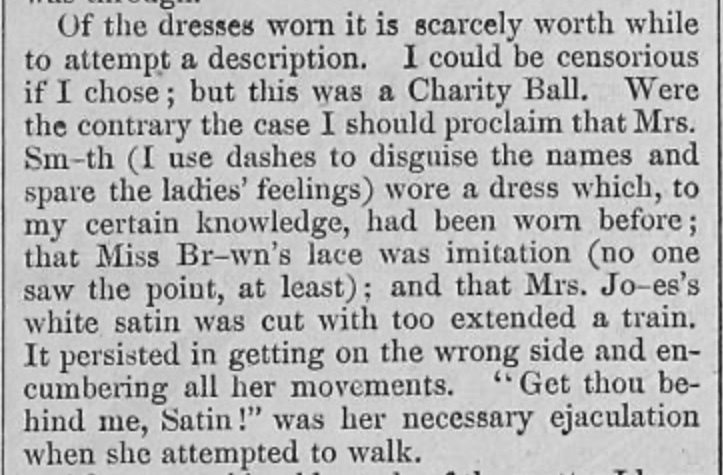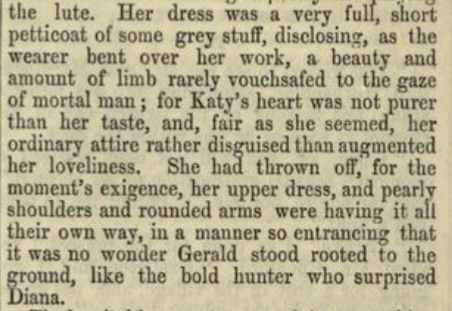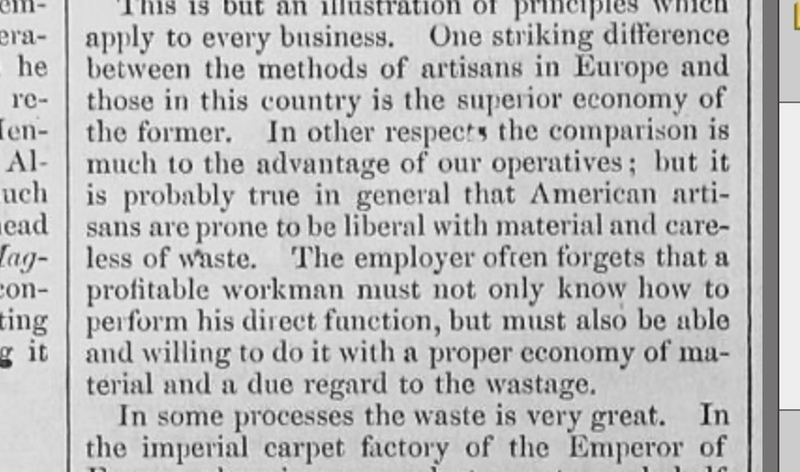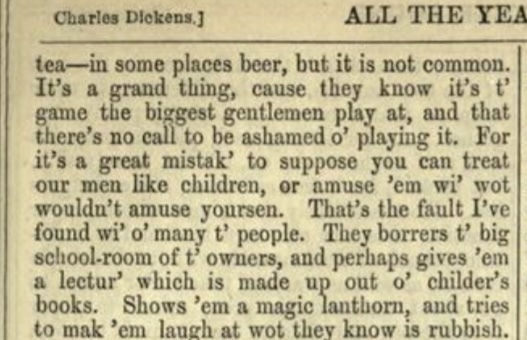Part 11- Annabelle Green
Social Class and Morality in The Moonstone
In 1868 Wilkie Collins’ The Moonstone was published in America’s Harper’s Weekly and Britain’s All The Year Round magazines. It is evident that Harper’s Weekly portrays their content extravagantly with many pictures alongside the writing. In comparison, All The Year Round contains no illustrations, only literature. Although both publishers portray social class and morality within their content they do so in different regards. The U.S. publisher tries a more direct approach, literally telling the reader how to dress and act of high class. The British publisher alternatively expresses social class through stories and experiences. It is well known that social class and morality were important to society during the 19th century, determining not only your wealth, but your respectability and credibility. In Wilkie Collins’ The Moonstone social class and morality are major themes throughout the novel portrayed through elements of femininity, labour roles, and treatment.
In Harper’s Weekly: Inigo at The Charity Ball, themes of social class are portrayed through femininity and the expression of women’s clothing through a direct approach. In the excerpt the author, Inigo, critiques how and what was worn by women, he writes, “Mrs. Sm-th wore a dress which, to my certain knowledge, had been worn before; that Mrs. Br-wn’s lace was imitation; and that Mrs. Jo-es’s white satin was cut with too extended train” (Harper’s Weekly Inigo 167). The detail in which Inigo recounts the ladies attire reveals the theme of social class through femininity. He critically and directly states why their dresses are low class suggesting the “imitation” alludes to it not being authentic and “worn before” meaning it is not new. This ultimately highlights the connection between social class and morality implying that one would be more respectable having authentic and new clothing. Inigo’s interpretation in Harper’s Weekly tells the reader how to dress of higher class.
In The Moonstone Rosanna Spearman is an element of social class and morality portrayed through femininity and labour roles. When Sergeant Cuff and Mr. Betteredge were searching for Rosanna and suspected she left to seek materials Collins writes, “If it had been Miss Verinder’s nightgown, she would have had to buy lace, and frilling… Plain long cloth means a plain servant’s nightgown” (Collins 99). The quote unveils the comparison between upper class, Rachel, and lower class, Rosanna, through differences between the quality of their nightgowns. Rosanna’s job as a servant lowers her status affecting her credibility ultimately resulting in a moral disapproval and leaving her as a suspect to the crime. This relates to the dresses that Inigo described and how what you are wearing can define your social class.
It is apparent that social class is intertwined with morality as Rosanna’s credibility is tainted from her past and role as a servant. Her low class and past suggests that she would gain from stealing. The novel evidently judged her attire when concerning the nightgown. In Michael Halewoods “‘Class is Always a Matter of Morals’” he writes, “Social class is often associated with complex forms of moral disapproval” (Halewoods). The quote supports the idea that social class and morality are linked. Clothing and social morality were clearly connected during this period. Women were evidently scrutinized for the style and modesty of their attire enduring shame and disrespect if it wasn’t up to the standards.
The second item from All The Year Round: The Squire’s Temper-Trap is a several part story revealing themes of morality and social class through a story. The main character, Mr. Rochford, attempts to pursue Katy, but this is against his fathers wishes because of her class, as shown when the author writes, “Katy's heart was not purer than her taste, and, fair as she seemed, her ordinary attire rather disguised than augmented her loveliness” (All The Year Round 332). The passage describes how Katy’s “plain” dress damages her class, taking away from her pleasantness and it is later told in the story that Mr. Rochford argues with his father over Katy’s class. All The Year Round chooses to display social class through a story to create relatability to the reader and to send a message that if the reader is not high class, they cannot obtain a husband.
In the novel, Rachel who is upper class is described in a different light regarding themes of femininity, morality and social class. Evidently she is narrated through an alternate lens compared to Rosanna, one that is less harsh. As Miss Rachel was preparing to leave for her aunt’s, Collin describes her, “ Very nicely dressed in some soft yellow stuff, that set off her dark complexion, and clipped her tight round the waist. She had a smart little straw hat on her head, with a white veil twisted round it” (Collins 100). This description reveals the theme of social class and the privilege of upper class using diction like “nicely” and “smart” to portray her morality. Rachel is described as more feminine resulting in her appearing more moral, compared to Rosanna or Katy who are both described in a harsh light.
In Harper’s Weekly: Economy of Material it explains the importance of not wasting extra materials and to utilize them for extra profit. This portrays themes of social class through labour roles by introducing how to be profitable like an upper class worker. This is uncovered when the author writes, “A profitable workman must not only know how to perform his direct function, but must also be able and willing to do it with a proper economy of material and a due regard to the wastage” (Harper’s Weekly 174). The quote illustrates social class and labour roles through explaining how to be profitable as a worker implying that they have to be aware and willing to work with waste. Although an upper class business may not even have to worry about waste, it is evident that Harper’s Weekly suggests to the reader that if they take their advice, they can improve social class and profit.
In Wilkie Collins novel, Rosanna Spearman is a servant during the disappearance of the diamond and is presumed to be attempting to replace her nightgown as a result of her suspected immorality. Due to her employment as a servant she must sew a new nightgown instead of purchasing a new one. This is evident when Wilkie Collins writes, “She bought nothing at maltby’s but a piece of long cloth. She was very particular in choosing a certain quality. As to quantity, she bought enough to make a nightgown” (Collins 99). Rosanna’s social class and morality is showcased through her labour role suggesting that the quality and quantity were particular to her attire, not Miss Verinders. This shows how her class constraints her as she lacks the privilege to buy a new nightgown. In comparison to being a profitable worker, Rosanna cannot afford to have waste and must purchase the exact quantity for the nightgown.
In All The Year Round a piece titled “Coal” illustrates the theme of social class and morality through labour. This excerpt portrays the hardships of lower class jobs as conveyed when the author writes, ““For it's a great mistak' to suppose you can treat our men like children, or amuse 'em wi' wot wouldn't amuse yoursen. That's the fault I've found wi' o' many t' people. They borrers t' big school-room of t' owners, and perhaps gives 'em a lectur' which is made up out o' childer's books” (All The Year Round 329). The quote not only captures the lower class but it also portrays the lower education through the quality of writing. In this quote the condescending treatment the pitmen receive from the gentlefolk is described, implying that they are treated like children due to their lower class jobs. It is apparent that All The Year Round is attempting to send a message about class through this story unveiling the hardships that one endures in a low class job. This message serves as a warning for the reader of can happen when one is perceived as less moral due to one’s field of labour.
In this instalment of The Moonstone, there is a portrayal of morality and class between upper class, Sergeant Cuff, and lower class, Mr. Betteredge through the element of labour roles. When the two worked together to find Rosanna, Sergeant Cuff says to Mr. Betteredge, “‘If this man,’ said the Sergeant (apparently meaning me), ‘only understood the growing of roses he would be the most completely perfect character on the face of creation’” (Collins 102). It is conveyed in this passage how Cuff talks down to Betteredge as if he believes he is more knowledgeable than him because Betteredge is a servant. This treatment, similar to the pitmen and the gentlefolk, illustrates how class and morality can affect how one can be viewed as less respectable or not as smart as compared to someone above them.
The idea that social class and morality are intertwined is projected between Cuff and Betteredge making a distinct divide between the two. Cuff clearly thinks Betteredge isn’t very bright because they are in different fields of labour. In Halewoods article he argues, “This differentiation between the 'lazy' and the 'hard-working' invokes a moral disapproval that reinforces and perpetuates divisions within and between social classes” (Halewood). In this quote it outlines how someone who is lazy is seen as a below in class compared to a hard worker, as jobs like servants are seen as lower class or “lazy” to Cuff. This goes hand in hand with the treatment of the pitman and Betteredge as their jobs are seen as less important and they are treated as less because of their positions.
All things considered, the importance of social class and morality during this period was evident throughout the novel as well as the advertisements in both Harper’s Weekly and All The Year Round through elements of feminism, labour, and treatment. The difference between the publications is that Harper’s Weekly attempted to convince the reader through a report that in order to be high class they had to take their advice. All The Year Round published stories involving social class and morality in order to create relatability with the reader sending messages through each character. The placement of this instalment in the context of the whole novel reveals the importance of social class in regards to morality. This instalment surrounds the peak of Rosanna’s suspicion around the disappearance of the moonstone. Considering the entire book is detective fiction attempting to solve who stole the moonstone, it is evident that morals played a major role in who was suspected to have committed the crime. In order to know someone’s morals, the easiest way is to perceive them through their class, ultimately putting lower class people, like Rosanna, at a disadvantage.
Works Cited
Collins, Wilkie. The Moonstone. 1868.
Halewood, Michael. “‘Class Is Always a Matter of no Morals’: Bourdieu and Dewey on Social Class, Morality, and Habit(Us).” Cultural Sociology, vol. 17, no. 3, 2023, pp. 373–89, https://doi.org/10.1177/17499755221108135.
Inigo. “Inigo At The Charity Ball.” Harper’s Weekly: A Journal of Civilization, 14 March 1868. : p. 167, print
Spicer, Henry T. “The Squire’s Temper Trap.” All The Year Round. 14 March 1868, p. 332. Dickens Journals Online, https://www.djo.org.uk/all-the-year-
Unknown Author. “Coal.” All The Year Round. 14 March 1868, p. 329, Dickens Journals Online, https://www.djo.org.uk/all-the-year-
Unknown Author. “Economy of Material.” Harper’s Weekly: A Journal of Civilization, 14 March 1868: p. 174, print.
No resource selected



